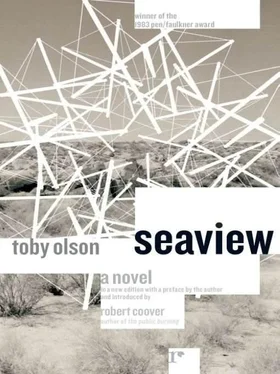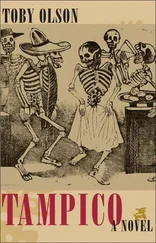He stood very still where he was, looking up. Above him he could see the open sky, and as he watched it, a dark element of clouds began to drift across it into the framed field of his vision. The clouds were very dark, almost pure black and as thick as oil smoke. He heard the man shift around a little as he looked, felt him circle the chimney still looking. Then he stopped. He imagined him looking up at the clouds as he was, their attention focused on the same issue. They were very close together, and he felt embarrassed in his secrecy, wrong and shy. The clouds had moved in, and the patch of sun that had entered the chimney, oddly exposing him, was gone. He felt his hair lifted slightly, his scalp touched by a cool breeze. Then he heard the sound of gunfire. He thought at first that it was thunder or more mock Old West battling, but he heard the man suck in his breath and shift quickly and pause; he could feel his attention.
“Christ!” he heard the man say sharply, and then heard him scrambling down from the peak. He felt the roof return to its architecture as the man left it. He heard the tree groan and the dull thud as the man’s feet hit the ground. The door to the rose tree fence ground on its hinges a little as the man opened it, and then he could not hear anything at all.
He waited. He remembered living in Bisbee, twenty-five miles from here, when he was in high school. Bisbee was at the top of the low mountains, the southern end of the Continental Divide before it dipped into Mexico. In the winter, it got cold and snowed in Bisbee. But he did not think that it got so cold in Tombstone, at least not cold enough to warrant a chimney of this size. He was not sure about that, though. Another odd thing was the locked screen doors. It was the middle of the day, and he could not figure why she had them locked. He shook himself back, realizing he was beginning to daydream. The first question was, had they got any significant look at him. Second, did they have any line on his car. He did not take time to figure the chances. The car would tell the story; if they got that he was sunk. There was enough in the trunk and the glove compartment to nail him. Hysteria began to creep up in him as he thought of Melinda, the possibility of not making it East with her, but he pushed it back down.
He rose from his crouch, put his elbows on the brick outside of the flue, and hoisted himself up until he was sitting on the bricks with his legs dangling into the hole. He could see the top of the rose tree and the street a few houses away. He knew if he looked around he would be able to see back to the place where the truck had stopped. He was too exposed, and he got his legs out of the hole, turned, and lowered himself down the side of the chimney to the peak of the roof. He saw there was still nobody visiting the rose tree, and though the enclosure made him uneasy, he climbed from the roof to the tree’s limbs, working his way down, and dropped to the ground. It was much darker than it had been before in the rose tree enclosure; the dark clouds hung high and heavy up through the branches. They had moved in over the town and stopped.
He went to the fence in the wall and opened the gate, stepped out and moved to the sidewalk, starting back in the way he had initially come. There were a few tourists walking the street on which the Crystal Palace was located a block away to his right. He crossed the street and continued on toward where his car was parked. There were a couple of people walking the other side of the street, but they took no notice of him. When he got to the corner, he did not turn toward the car but waited while the traffic passed. Coming into the town and leaving it to get to Route 80, the traffic was heavier on this street, and he had to wait for some time for the light to change. He saw that no one was around the car. Another car had parked behind, but it was empty. It was not the car that belonged to the two men, he thought, but he wasn’t sure. He crossed the street when the light changed, went another block, and turned to his right, walking until he came to the corner of the street that would lead him back to the Crystal Palace. He realized he was holding back from approaching the car and that he had no good reason for doing so. They either had a line on him or they didn’t, whoever they were, and he had better just go to the car and see what happened. He turned toward the Crystal Palace, walked the block to the street on which he was parked, and turned right again, getting the keys out of his pocket as he moved. When he reached the car, he unlocked the door, got in, started it up, and when there was a break in the traffic, pulled out into the street and drove away.
When he hit Route 80, he brought the car up to sixty miles an hour, lit a cigarette with the dashboard lighter, and settled himself into the seat. Then he began to relax a little and to think things over. He felt a quick chill as the realization hit him that he could have left the car where it was and hitched back to Tucson. If they had a line on the car, leaving it there would have given him some time, maybe even enough to get away East. This was not his line of work, that was sure; he had been lucky. There was one thing he knew then. There would be no drop-off of cocaine in Kansas City. He would put more miles between them, then he would get in touch with Richard. A few minutes after the rain had begun hitting the windshield, pelting the town behind him in a heavy wash, he drove the car out from under it, into the light of a clear sky and the edge of the beginning of twilight.
WHAT TREES THERE WERE OUTSIDE COULD BEND THEIR boughs, their twigs reaching, in that green aching intensity they wear, out to touch each other in the night, and he wouldn’t care. There were, in fact, two walnut trees, because in the late eighteen-eighties this had been a walnut grove: black walnuts, their small protected satellites, in green jackets, scattered under the boughs. The flesh within those meaty jackets, under those hard, brainlike shells, he could have eaten, sat beside a fire, in a soft chair, with a cat and a bottle of good wine, some cheese. Even a small space heater, because this was California, little change, and in the winter just small bites at times; he could have faced it in against his legs, the way his father had put feet up on ottoman, before the fender, felt toasty warm, hearing the little crackles. The trees had made their peace so many years ago, much like the large rock in Idaho into which pioneers had carved their names, those of their wives and children, and their dates of passage.
In the failed and now intractable bark: hearts, initials, and gang names, some spray paint on the trunks and lower limbs. He could have trimmed the bark and sprayed the holes with sealer, done some small amount of pruning, gathered up the fallen nuts before the birds got to them, but the fact was he had never set foot beside the entrance path, running from the cyclone gate up to the porch, had only seen the backyard while shaving, and not because he had in any way intended to look there. He had lived in the house for one year. The man there before him had put up the cyclone fence to keep his dogs in, two Dobermans who roamed the yard at night, dark, aware, and silent, keeping the place safe. He didn’t need the fence, he had certain powers, and the kids stayed away.
There were raspberries along the back fence and a small lemon tree, four feet tall, in the corner, feeble but surprising in its fruit. There were flowers, mostly hidden, but not choked off, by the variety of weeds around them. And the weeds themselves were beautiful. He could have brought some in and dried them, put them in a container on a window sill, noticed the way they looked in sun and shade. The flowers were poinsettias, (oddly) a few columbines, and morning-glories. Once, a century plant had come to bloom for a few days, but he had not seen it. Along the fence running the sides of the house, through windows by which he only passed, could have been seen remnants of rhubarb and the orange vines that are often found in the company of poison oak, and poison oak as well. To both sides of the front gate were shrubs, and in among them the new shoots of an avocado tree were coming on strongly, and maybe in a few years a large tree, with its green and bulbous fruit, would be growing there. Even had he known of all these things, he would not have thought of the grounds around the house as all potential and realization; he would not have thought of the place as a yard at all. It was another world; he had no knowledge of, nor care for, its seedy warmth and complexity.
Читать дальше












